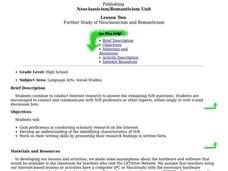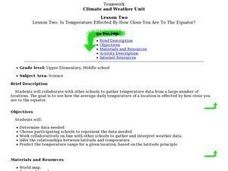Curated OER
Local Heart Rates
Students determine the type of data needed to test their inferences. As homework, they check and record heart rates of fellow students, teachers and family members. During their next class period, students enter all data into the database.
Curated OER
Further Study of Neoclassicism and Romanticism
Students continue to conduct Internet research to answer the remaining N/R questions. They are encouraged to contact and communicate with N/R professors or other experts, either singly or over e-mail discussion lists.
Curated OER
Creating a Map for Future Reference
Students use Web and other resources to create maps of either the site of their day trip, their final destination, the entire trip, or some combination of these.
Curated OER
Stopping Along the Way
Students use atlases, maps, and Web resources to plan a day trip to at least one city or point of interest that is on the way to their final destination.
Curated OER
Earth Day Trash Survey Unit
Learners develop a questionnaire to distribute via e-mail or Web page forms that visitors fill out based on the data they gathered during their clean-up activities.
Curated OER
Creating a Web Cookbook
Students use software to write a menu, including suggestions based on their own experiences cooking them, cultural and social context for their recipes and pictures or graphics. They shop for and cook the dinner for their families.
Curated OER
Selecting and Analyzing Recipes
Students use the Web and other resources provided to select several recipes to combine into a menu they can cook for their families at home. They develop a sense of how food is prepared and kinds of preparation necessary to cook their...
Curated OER
Share Classroom Fat Data with Other Students
Students research eating habits in different places and in different cultures.
Curated OER
Selecting A Destination
Students utilize atlases, maps, and Internet resources to select destinations and places to stop along the way on a day trip. They examine and write about the reasons they want to visit the particular places they chose.
Curated OER
Further Study Of Neoclassicism And Romanticism
High schoolers conduct Internet research to answer the remaining N/R questions. They are encouraged to contact and communicate with N/R professors or other experts, either singly or over e-mail discussion lists.
Curated OER
What Causes Irregular Temperature Patterns?
Students examine common trends in climate across the U.S. They identify the anomalies in hot-cold temperature differences in the U.S and locate them on the map using latitude and longitude coordinates.
Curated OER
Is Temperature Effected By How Close You Are to the Equator
Students collaborate with other schools to gather temperature data from a large number of locations. They determine how the average daily temperature of a location is affected by how close you are to the equator.
Curated OER
Planting
Students form groups to conduct an experiment. They plant seedlings to test the effects of sunlight, water and soil, on the growth of seedlings.
Curated OER
What Makes a Healthy Plant?
Students predict the effects of water, light, and soil on the development of a plant and then design an experiment to test their predictions.
Curated OER
Application
Students apply and generalize data, and prepare and present an oral presentation with a visual aid.
Curated OER
Presentation of Findings
Students compile and format their findings from the worm bins, the plant activity, and their Internet research on related topics into scrapbooks.
Curated OER
Growing Plants with Worm Castings
Learners test worm castings for content and use them to grow seeds. They hypothesize which castings best sustain seed growth. They observe growing plants to test their hypotheses. Later they graph their data.
Curated OER
Worm Bin Project Data Exchange
Students work collaboratively to exchange data with their peers (groups of students at other schools) about their worm bin project. They discuss differing findings and hypothesize reasons for these differences.
Curated OER
Introduction to Worm Bin Project
Students observe the decomposing process of the food chain in a worm bin. They observe whether the type of food fed to worms affect the castings given off during the decomposition process. They learn and practice graphing their findings.
Curated OER
Technology's Influence on Language
Students use Internet resources to examine the influence of technological terminology on English and other languages.
Curated OER
What's in a Name?
Students use Internet and library resources to find the meanings of their first and/or last names and discuss the evolution of the concept of naming individuals.
Curated OER
Critiquing the Neoclassicism/Romanticism Project
Students request feedback on their projects from Neoclassicist/Romanticist experts they have contacted via e-mail or other means. They work in pairs to critique each other's work.
Curated OER
Story Assignments
Students choose their beats and decide what areas of school and community news they cover.
Curated OER
Virtual Ellis Island Museum Unit:
Students conduct secondary source research using the internet and library resources to research the backgrounds of their family's cultural and ethnic heritages.

























